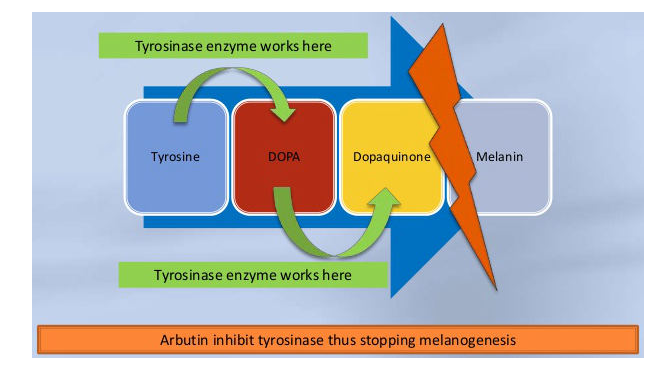Arbutin, specifically alpha-arbutin, has become a highly sought-after ingredient in the skin care community. But what does arbutin do for the skin, and why is it so popular? In this article, we’ll discuss what arbutin is, how it works, the benefits of alpha-arbutin, and more.
01. What is arbutin?
Arbutin (chemical name: hydroxyphenyl-D-glucopyranoside) is a naturally occurring compound (chemical formula: C12H16O7), a plant in the genus Ursi of the Ericaceae family. It is a glycoside derived from hydroquinone, a substance known for its skin-whitening properties.
Generally speaking, arbutin is famous as a mild skin whitening agent. It is suitable for most skin types and often appears in various skin care products, such as essences, creams, and medical beauty whitening water. There are three main forms of arbutin:
A alpha-arbutin
The most common and most potent form of arbutin. Alpha-Arbutin is a glycoside. α-Arbutin is 15 times more potent in inhibiting tyrosinase activity than β-arbutin. α-Arbutin is more expensive to manufacture, but is more effective and is currently the most effective type.
B β-Arbutin
This form is less stable than alpha-arbutin. The manufacturing cost of β-arbutin is low. The biggest difference in physical properties between α-arbutin and β-arbutin is the optical rotation: α-arbutin is about 180 degrees, while β-arbutin is It’s about -60.
C Deoxyarbutin
This is a synthetic derivative of arbutin. It is designed to provide more effective skin lightening effects. It is more stable than alpha and beta arbutin, and is 350 times more stable than arbutin (beta-arbutin). If compared with the popular alpha-arbutin, it is 38.5 times more stable. But it requires careful preparation and use. This is because higher concentrations may cause skin irritation or sensitivity.
02. How arbutin works
When applied to the skin, arbutin is absorbed into cells and acts as a melanin inhibitor. Arbutin effectively blocks the enzyme responsible for converting tyrosine into melanin (called tyrosinase). This is important because melanin is the pigment that gives skin its color.
Excessive melanin production can lead to dark spots, hyperpigmentation, uneven skin tone, and other pigment-related problems.
Arbutin does more than just inhibit tyrosinase. It competes with the enzyme, binding to certain sites and preventing tyrosinase from performing its role in melanin production. This reduces melanin production, thereby eliminating hyperpigmentation. It also prevents the formation of new dark spots. Over time, arbutin can help skin tone become more even and radiant.
03. What are the effects of α-arbutin?
Commonly used whitening water/skin care products on the market mainly contain α-arbutin. The following is a detailed introduction to the effects of α-arbutin.
1Whitening and lightening spots
Arbutin can penetrate deeply into the skin quickly. Without affecting the concentration of cell proliferation, it can effectively inhibit the activity of tyrosinase in the skin, block the production of melanin, and whiten and remove pigmentation.
2 anti-inflammatory and antibacterial
Patients with skin inflammation include those with sensitive skin, acne and burns. It can inhibit inflammation, quickly reduce swelling and accelerate healing, and has analgesic and anti-inflammatory effects. Arbutin is also commonly found in some acne repair products.
3 antioxidant
Can protect cells from oxidative damage caused by hydrogen peroxide. While repairing damage, it can also maintain cell activity, so it has a certain antioxidant and revitalizing effect.
Mobile Phone: 86 18691558819
Irene@xahealthway.com
www.xahealthway.com
Wechat: 18691558819
WhatsApp: 86 18691558819
Post time: Apr-19-2024







